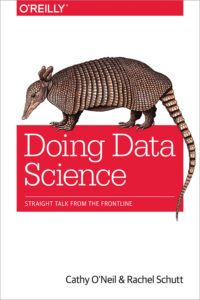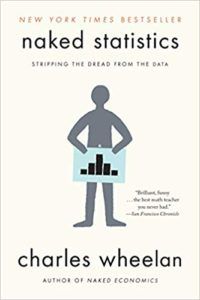On the surface, it can seem intimidating (especially for those of us who haven’t had to take a math class since high school). But, as is true with coding, you don’t need to excel at math to be able to work with data. That’s why this article on data science books has been divided into two parts: “Introduction to Data Science Skills” will give you a foundation, while “Applied Data Science” will give you a picture of the many ways in which data can be applied and how it affects the world around us. (Note: As with many disciplines in technology, there is a glaring lack of diversity both in who gets hired into the field and in who gets to write about it. There is one author of color on this list. There should be more. To take a peek into some of the data behind why diversity in tech is such a pressing issue, check out this article by Devskiller.)
Data Science Books That Introduce Skills
Doing Data Science: Straight Talk from the Frontline by Cathy O’Neil and Rachel Schutt
Based on Columbia University’s Intro to Data Science class, Doing Data Science is a great starting point for anyone interested in the field. Data Scientists from companies such as Google and Microsoft share algorithms, models, and case studies they use to give the reader a more practical application.
The Art of Data Science by Roger D. Peng and Elizabeth Matsui
Written by two authors with extensive experience in managing and conducting data analysis, The Art of Data Science distills their knowledge into a digestible form. This book sticks to the fundamentals, making it a bit basic for experienced data scientists, but perfect for beginners.
Data Science For Dummies by Lillian Pierson
For readers looking for a primer covering the expanse of data science, this is the book to start with. Rather than covering instructional information, Data Science for Dummies broaches which technologies, programming languages, and mathematical methods to focus on.
Applied Data Science
The Signal And The Noise: Why So Many Predictions Fail—But Some Don’t by Nate Silver
Building on his groundbreaking experience in creating a system for predicting baseball performance, Nate Silver explores the world of prediction and the ways in which we can extract truth from data. Throughout the book, Silver examines forecasters of various types—including weather, poker, basketball, and the stock market—to evaluate the way they think and make predictions. He ultimately concludes that the most accurate forecasters have a superior command of probability, and by the end of this book, you’ll have the insight necessary to make stronger, more informed predictions.
Naked Statistics by Charles Wheelan
How can we catch schools that cheat on standardized tests? How does Netflix know which movies you’ll like? In Naked Statistics, Wheelan shows that with the right data and some statistical tools, we can have the answers to these questions and more. Though some of us may want to bolt at the mention of statistics, Wheelan breaks down technical details and instead, focuses on the underlying human intuition.
Automate This: How Algorithms Came To Rule Our World by Christopher Steiner
Increasingly, high-level tasks such as legal interpretation and policy analysis are being handled by algorithms. What started as basic computer logic has now surpassed our idea of what a bot can do. In Automate This, Steiner tells the story of how algorithms took over and are beginning to touch all aspects of our lives. He poses the question: What would the world look like if bots took over the human work of interpreting data and automating human instinct?
Everybody Lies: Big Data, New Data, and What the Internet Can Tell Us About Who We Really Are by Seth Stephens-Davidowitz
With the amount of data the world amasses on a daily basis, we’re often left with astonishing untapped data from which we can learn about the human psyche. This data offers insight into our biggest fears and desires, the decisions we make, and the behaviors that drive us. Everybody Lies examines big data to share insight into economics, ethics, sports, sex, gender, and more. Questions investigated include: Does where you go to school affect how successful you are in life? Do parents secretly favor boy children over girls? Do violent films affect the crime rate?
Weapons of Math Destruction: How Big Data Increases Inequality and Threatens Democracy by Cathy O’Neill
Living in the age of algorithms, decisions about our lives are increasingly made by mathematical models rather than by humans. The hope is that everyone is judged based on the same rules without bias, whether it’s the cost of health insurance or if we qualify for a loan. But in Weapons, O’Neill argues that the opposite is true. She brings to light the ways in which data and algorithms go largely unregulated, and often reinforce discrimination. As she puts it, “welcome to the dark side of big data.” For a broader introduction to computer science, check out our list of books about computer science for beginners.


